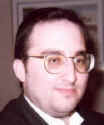|

|
D'var
Torah
by Rabbi Jay Spero |
The
Choices of Yakov & Esav
Contact Rabbi Spero at 862-9546 or jsohr1@juno.com
This
weekís portion tells the famous story of the two brothers, Yakov
and Esav (Jacob and Esau). The experiences of these two brothers did not
merely mold their own generation, but many generations to come. Yakov and Esav
each set a standard in his behavior which would be followed for over three
millennia, and which continues to be followed to this day.
What were the salient features of their actions, which are still
reverberating today?
We know that their grandfather, Avraham, signified a new beginning for
the world. One of his children, Yitzchak, went in his ways, i.e., he
sought to bring G-dís presence down to the world (The Maharal explains
that Avraham, Yitzchak, and Yakov were the "chariots" of G-d, that
they "carried" His Divine presence down to earth). Avrahamís other
child, Yishmael, chose not to follow the path of Avraham (as noted last week,
Avraham also had other children several years later).
Like Avraham, Yitzchak had two children: Yakov and Esav. Both Yakov and Esav
possessed extraordinary potential. Ideally, Esav would have been the king of the
Jewish people, and Yakov the high priest. Each brother would have symbolized a
different aspect of service to G-d, Esav concentrating on the physical, and
Yakov on the spiritual. Together, their roles would have been completely
synchronized.
Yakov fulfilled his role. Unfortunately, Esav did not. This left Yakov in the
difficult position of having to fulfill both roles. Instead of Esav being the
progenitor of G-dís chosen nation, he ended up being the progenitor of Amalek,
the nemesis of G-dís chosen people.
What
choices did he make which ensured this role?
One of the most significant acts of Esavís life was the sale of his birthright
-- a spiritual, not a physical, possession -- to Yakov. At the time of the sale
he told Yakov, "I will one day die, so what good is it to me this
birthright?" This summed up Esavís attitude: what good are spiritual
qualities? Once I absorb their lessons, I will be limited by what I can and
cannot do. And since anyway I will one day die, what good will this self
deprivation have achieved? His attitude illustrates he did not believe in
morality, or indeed, in any concept incapable of being seen, heard, or touched.
This earthly life, he felt, is the only thing that matters. When Esav realized
Yakov had received Yitzchak's blessings, he became angry and wanted something
from his father, too. The fact that Yitzchak acquiesced in Yakovís receipt of
the blessings meant nothing to him. It did not matter who was deserving of the
blessings, or that Esav had sold his right to them; what mattered to him was
that he wanted something and he was determined to get it (he sent his own son to
attempt to kill Yakov).
These are the ideas later espoused by Nietzsche: the idea of the
"superman" who takes what he needs. These are the ideas espoused by
Hitler, who once lamented that "the Jews gave the world a conscience."
These ideas are antithetical to Judaism. Jews believe it is not what you
possess, but who you are and how you behave, that matters; that mankind has a
glorious purpose in the world and that the Jewish nation, through their keeping
of the Torah, will be in the forefront of bringing G-dís goodness down to this
earth.
We -- the children of Yakov -- must endeavor to avoid the ways of Esav, and
instead go in the ways of Yakov.
Rabbi Jay Spero is the rabbi
of the Saranac Synagogue in Buffalo.
|
